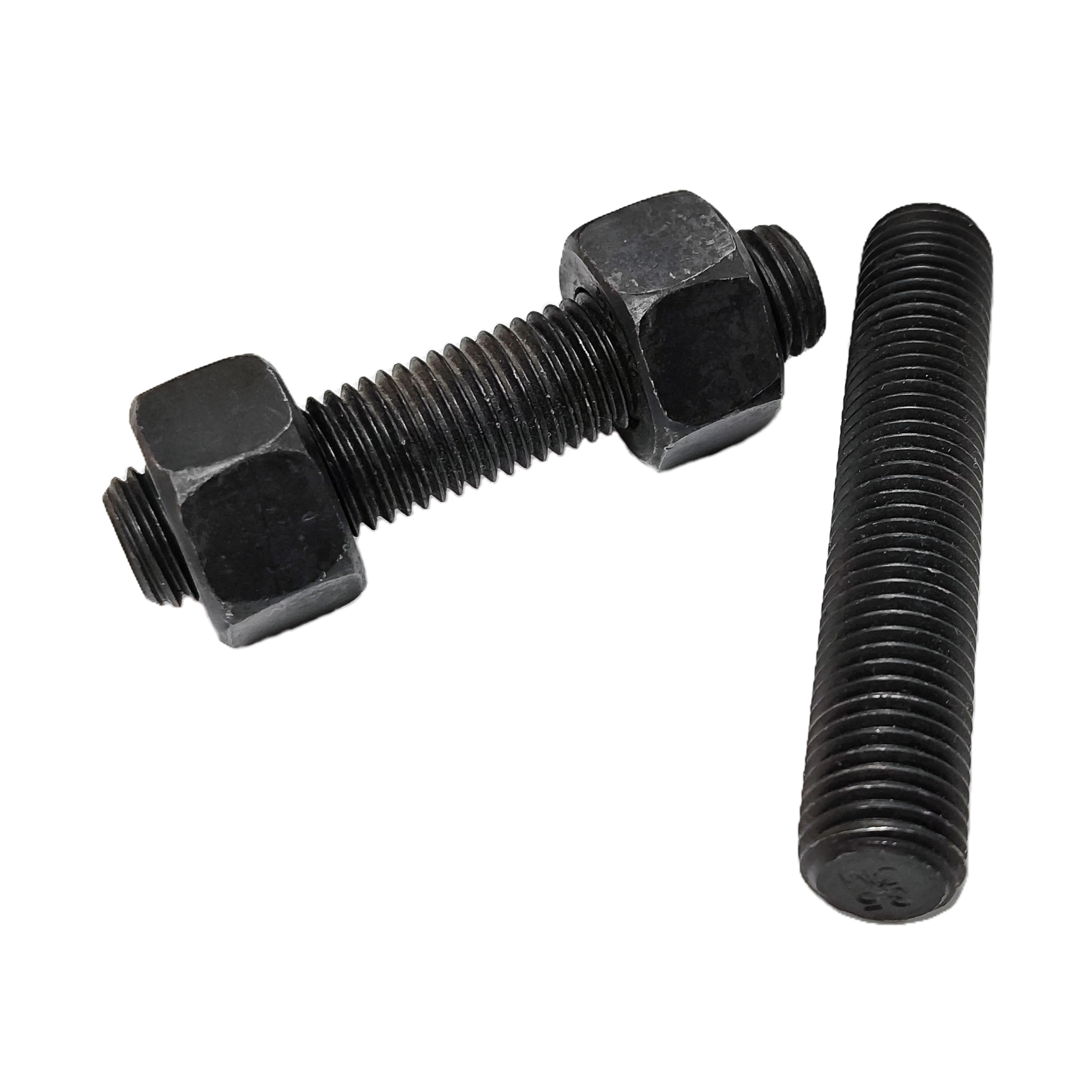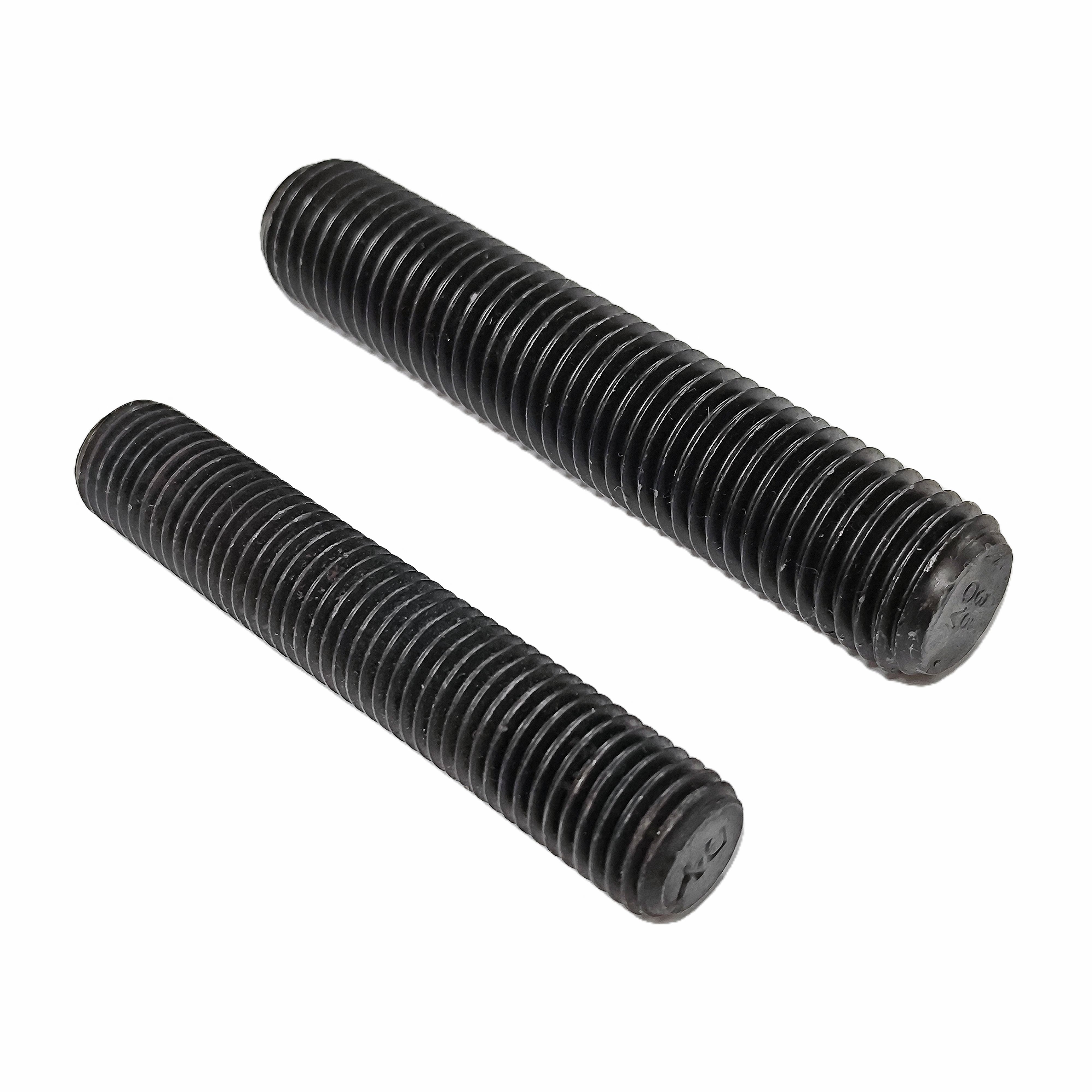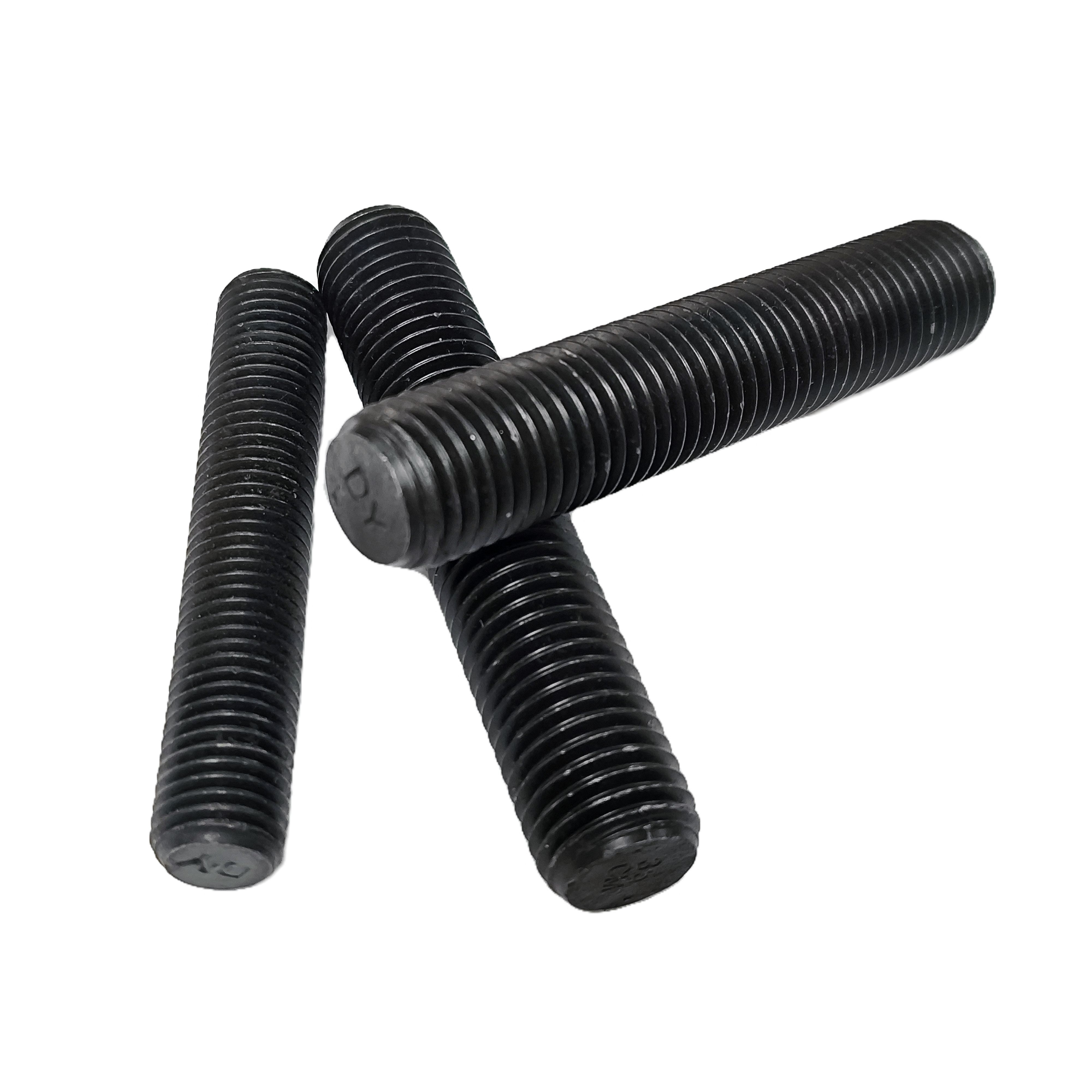

Full Thread Studs: Max Strength & Secure Fastening Solutions
Aug . 26, 2025 04:00 Back to list
Full Thread Studs: Max Strength & Secure Fastening Solutions
The Indispensable Role of full thread stud in Industrial Applications
In the demanding world of industrial engineering, the integrity and reliability of fastening solutions are paramount. The full thread stud stands as a cornerstone component, engineered to provide robust and secure connections across a multitude of critical applications. Unlike partially threaded bolts, a stud bolt fully threaded offers maximum engagement with mating components, ensuring superior load distribution and enhanced resistance to shear and tensile forces. This comprehensive article delves into the critical aspects of full thread studs, from their manufacturing precision and diverse application scenarios to their technical advantages and the critical considerations for B2B procurement.
We will explore the evolving industry trends, detailed technical specifications, and the rigorous quality standards that govern the production of a reliable stud bolt full thread, providing valuable insights for engineers, procurement managers, and project developers seeking optimal fastening solutions.
Industry Trends and Market Dynamics for Fully Threaded Studs
The global industrial fasteners market is experiencing dynamic shifts, driven by advancements in material science, increasing infrastructure development, and stringent safety regulations. For components like the stud bolt full thread, key trends include:
- High-Performance Materials: Growing demand for studs manufactured from advanced alloys (e.g., Duplex, Super Duplex stainless steels, Inconel) to withstand extreme temperatures, pressures, and corrosive environments in sectors like oil & gas, chemical processing, and power generation.
- Sustainable Manufacturing: A push towards more energy-efficient production processes and the use of recyclable materials, aligning with global environmental objectives.
- Smart Fasteners: Emerging trends include the integration of sensors for real-time monitoring of tension and stress, enhancing predictive maintenance capabilities in critical structures.
- Customization and Specialization: Increasing need for highly customized stud full thread solutions tailored to unique project specifications, including non-standard lengths, thread pitches, and specialized coatings for enhanced performance and longevity.
- Digitalization of Supply Chains: Adoption of advanced analytics and IoT for optimizing inventory management, improving traceability, and accelerating lead times for complex fastener orders.
These trends underscore the evolving landscape where precision, durability, and adaptability are not merely desirable but essential for industrial success.
Technical Specifications and Parameters of Full Thread Studs
A full thread stud is characterized by its threads extending along its entire length, providing maximum engagement and superior load-bearing capacity compared to other stud types. Key technical parameters include:
- Material Grades: Common materials include B7 (AISI 4140, alloy steel, heat-treated), B16 (AISI 4140/4142, alloy steel, heat-treated for high temperature service), L7 (AISI 4140, alloy steel, heat-treated for low temperature service), 304/316 Stainless Steel (corrosion resistance), and specialized alloys like Duplex, Super Duplex, and Inconel for extreme conditions.
- Thread Standards: Predominantly manufactured to Unified Inch Screw Thread (UNC, UNF) or Metric ISO Screw Thread standards. Key dimensions are governed by ASME B1.1 (for inch series) and ISO 68 (for metric series).
- Dimensional Standards: ASTM A193/A193M and A320/A320M specify material and dimensional requirements for alloy steel and stainless steel bolting for high/low temperature service, respectively. ASME B16.5 often specifies the required bolting for flange connections.
- Surface Finishes/Coatings: Options include Zinc Plating (for corrosion protection), Hot-Dip Galvanizing (HDG for enhanced protection in harsh environments), PTFE (Xylan/Teflon, for improved corrosion resistance and reduced friction), Cadmium Plating, and various phosphate coatings.
- Tensile Strength and Hardness: Critical mechanical properties determined by the material grade and heat treatment, ensuring the stud can withstand specified loads without deformation or failure. For example, ASTM A193 Grade B7 specifies a minimum tensile strength of 125 ksi (860 MPa).
Product Specification Table: Common Full Thread Stud Grades
| Characteristic | ASTM A193 Grade B7 | ASTM A193 Grade B16 | ASTM A320 Grade L7 | ASTM A193 Grade B8 (304 SS) |
|---|---|---|---|---|
| Material | AISI 4140 Alloy Steel | AISI 4140/4142 Alloy Steel | AISI 4140 Alloy Steel | 304 Stainless Steel |
| Application Temp. | Up to 450°C (850°F) | Up to 593°C (1100°F) | Down to -101°C (-150°F) | Cryogenic to ~538°C (1000°F) |
| Tensile Strength (min) | 125 ksi (860 MPa) | 125 ksi (860 MPa) | 125 ksi (860 MPa) | 75 ksi (515 MPa) |
| Yield Strength (min) | 105 ksi (725 MPa) | 105 ksi (725 MPa) | 105 ksi (725 MPa) | 30 ksi (205 MPa) |
| Hardness (max) | 35 HRC | 35 HRC | 35 HRC | 223 HBW |
Application Scenarios and Target Industries
The versatility and strength of a stud bolt fully threaded make it indispensable across numerous heavy industries, where reliable connections are paramount for operational safety and efficiency.
- Petrochemical Industry: Used extensively in flange connections for pipelines, pressure vessels, heat exchangers, and reactors where high temperatures, corrosive fluids, and high pressures are common. The resistance to corrosion and high-temperature creep offered by specialized materials significantly extends service life and reduces maintenance downtime, contributing to energy saving by preventing leaks.
- Power Generation (Thermal & Nuclear): Critical for securing components in turbines, boilers, and other high-stress, high-temperature environments. B16 and B7 materials are standard, ensuring structural integrity under severe thermal cycling and constant vibration.
- Metallurgy & Heavy Manufacturing: Employed in furnace construction, heavy machinery assembly, and structural steel applications where robust, vibration-resistant fastenings are required to maintain operational stability.
- Water Supply & Drainage: Stainless steel stud whole threaded bolts are vital for connecting pipes, pumps, and valves in water treatment plants and large-scale irrigation systems, where resistance to water, chemicals, and environmental factors is crucial for long-term infrastructure reliability.
- Construction & Infrastructure: From bridge construction to large building frameworks, these studs offer a reliable method for anchoring and connecting structural elements, especially where dismantling for maintenance or modifications is anticipated.
- Marine & Offshore: In highly corrosive saltwater environments, specialized coatings (e.g., PTFE) and materials (e.g., Duplex stainless steel) are essential for stud bolt full thread applications on oil rigs, platforms, and shipbuilding, ensuring structural integrity and longevity against chloride attack.

Image: Full thread studs ready for industrial application.
Technical Advantages of Full Thread Studs
The design of a full thread stud inherently offers several distinct technical advantages:
- Maximum Thread Engagement: The entire length being threaded allows for maximum engagement with nuts or tapped holes, distributing load over a larger area, which significantly reduces the risk of thread stripping and enhances joint integrity. This is particularly crucial in high-stress applications.
- Uniform Stress Distribution: Unlike partially threaded bolts where stress concentrations can occur at the thread run-out, a stud whole threaded steel provides more uniform stress distribution along its length, leading to higher fatigue resistance and overall longer service life.
- Versatility in Length: Full threading allows for easier adjustment of engagement length without compromising thread integrity, making them adaptable to variations in flange thickness or material depths. They can be cut to precise lengths on-site if needed, reducing inventory complexities.
- Simplified Installation and Maintenance: The full thread allows for easier alignment during assembly and often simplifies the use of anti-galling coatings (like PTFE), which aid in future disassembly, reducing maintenance time and costs.
- Enhanced Corrosion Resistance: When coupled with appropriate materials (e.g., stainless steel, superalloys) and advanced coatings (e.g., HDG, PTFE), full thread stud bolt can offer exceptional resistance to a wide range of corrosive agents, drastically extending their operational lifespan in harsh environments.
- High Tensile and Shear Strength: Engineered from high-strength materials and heat-treated, these studs provide superior resistance to both tensile and shear forces, critical for maintaining the structural integrity of heavy industrial machinery and infrastructure.
Manufacturing Process Flow for Full Thread Studs
The production of a high-quality full thread stud involves a meticulously controlled process, adhering to international standards to ensure optimal performance and reliability. Our process flow emphasizes precision at every stage:
- Material Procurement and Inspection: High-grade raw materials (e.g., alloy steel bars, stainless steel rods) are sourced from certified mills. Each batch undergoes rigorous inspection for chemical composition, mechanical properties, and metallurgical integrity to meet ASTM, ISO, or client-specific standards.
- Cutting and Straightening: Raw material bars are cut to specified lengths using automated saws, followed by straightening to ensure dimensional accuracy and minimize run-out during subsequent operations.
- Thread Rolling or Cutting:
- Thread Rolling: Preferred method for higher strength and improved fatigue resistance. The threads are formed by displacing material using dies, preserving the grain flow and enhancing surface hardness. This method is crucial for critical applications.
- Thread Cutting: Used for very large diameters or specific material types. Material is removed to form the threads.
- Heat Treatment (for alloy steels like B7, B16, L7): Studs undergo carefully controlled heat treatment processes – typically quenching and tempering – to achieve the desired mechanical properties (tensile strength, yield strength, hardness) as specified by ASTM A193/A320. This is performed in state-of-the-art heat treatment facilities with precise temperature and atmosphere control.
- Surface Treatment and Coating: After heat treatment, studs are cleaned and then coated based on application requirements. Common coatings include zinc plating (electrolytic), hot-dip galvanizing, PTFE (fluoropolymer, e.g., Xylan, Teflon), or phosphate coatings. Each coating is applied and tested for adhesion, thickness, and uniform coverage.
- Final Inspection and Testing: Each stud bolt full thread undergoes a comprehensive final inspection, including:
- Dimensional Inspection: Using gauges and calipers to verify length, diameter, thread pitch, and form.
- Mechanical Testing: Tensile strength, yield strength, hardness, and impact testing (for low-temperature grades like L7).
- Non-Destructive Testing (NDT): Magnetic Particle Inspection (MPI) or Liquid Penetrant Inspection (LPI) to detect surface defects.
- Coating Thickness and Adhesion Tests: Ensuring corrosion protection standards are met.
- Marking and Packaging: Conforming to ASTM/ISO standards, studs are clearly marked with material grade, manufacturer's identification, and heat code. They are then securely packaged to prevent damage during transit, often with protective wraps for specialized coatings.
This stringent process ensures that every full thread stud bolt leaving our facility meets the highest standards of quality, reliability, and performance, critical for applications where failure is not an option.
Vendor Comparison: Selecting the Right Partner
Choosing a reliable vendor for full thread stud components is crucial for project success. Key factors differentiate suppliers, impacting product quality, delivery timelines, and long-term cost-efficiency.
Key Differentiators in Full Thread Stud Procurement
| Feature/Criterion | High-Quality, Specialized Vendor (e.g., LZ Fasteners) | Standard Commodity Vendor |
|---|---|---|
| Material Sourcing | Certified mills, full traceability (MTRs available), premium alloys. | Cost-driven sourcing, limited traceability, standard grades. |
| Manufacturing Process | In-house advanced thread rolling, controlled heat treatment, rigorous QA/QC. | Outsourced processes, less control over specific quality parameters. |
| Certifications | ISO 9001, PED 2014/68/EU, TUV, API Q1, extensive product-specific certifications. | Basic ISO 9001, fewer specialized product certifications. |
| Customization | Full design & engineering support, custom materials, dimensions, coatings, testing. | Limited customization, primarily standard product modifications. |
| Lead Time & Logistics | Optimized production, global logistics network, expedited options. | Standard lead times, less flexibility, regional shipping. |
| After-Sales Support | Technical support, warranty, field service, detailed documentation. | Limited to basic product replacement. |
Partnering with a specialized supplier ensures that critical components like the stud bolt full thread not only meet but exceed demanding industrial specifications, offering greater peace of mind and long-term value.

Image: A range of full thread studs awaiting quality inspection.
Customized Solutions for Unique Demands
While standard full thread stud bolt options cater to many needs, specific project requirements often necessitate bespoke solutions. Leading manufacturers offer extensive customization capabilities:
- Material Adaptation: Sourcing and manufacturing with exotic alloys (e.g., Monel, Hastelloy, Titanium) for ultra-corrosive or high-temperature applications.
- Dimensional Precision: Producing non-standard lengths, diameters, and thread pitches to perfectly fit unique assemblies or legacy equipment.
- Specialized Coatings: Application of multi-layer anti-corrosion systems, ceramic coatings, or specific anti-galling treatments beyond standard options.
- Unique Heat Treatments: Tailoring heat treatment cycles to achieve specific hardness, ductility, or impact resistance profiles.
- Advanced Testing Protocols: Conducting supplementary tests such as Charpy V-notch impact tests at cryogenic temperatures, stress corrosion cracking tests, or simulated environmental testing to validate performance under extreme conditions.
- Custom Packaging and Kitting: Providing project-specific packaging, kitting of fasteners, or barcoding for streamlined on-site management.
This ability to provide tailor-made stud bolt fully threaded solutions ensures optimal performance and compatibility, minimizing risks and maximizing efficiency for complex industrial projects.
Application Case Studies: Proving Reliability in Practice
Case Study 1: High-Pressure Flange Connection in a Chemical Processing Plant
A major chemical processing plant faced recurring leaks in critical flange connections operating at 300°C and 150 bar, handling aggressive acidic media. Standard B7 studs with zinc plating experienced premature corrosion and creep. Upon consultation, the solution involved replacing the existing fasteners with full thread stud bolts manufactured from ASTM A193 Grade B16 material with a high-performance PTFE (Xylan 1424) coating. The B16 material's enhanced high-temperature properties prevented creep, while the PTFE coating offered superior chemical resistance and reduced friction during torquing, ensuring a consistent and leak-free seal. Post-installation, the plant reported zero leaks over a 3-year monitoring period, significantly extending maintenance cycles and improving operational safety.
Case Study 2: Offshore Platform Structural Integrity
An offshore oil platform required robust fastening for structural elements exposed to severe marine environments, including salt spray and constant wave action. Traditional stainless steel studs exhibited pitting corrosion over time, compromising structural integrity. Our team supplied custom stud full thread bolts made from Super Duplex Stainless Steel (ASTM A193 Grade S32750), known for its exceptional resistance to chloride-induced stress corrosion cracking and pitting. Each stud also received a specialized marine-grade ceramic coating for additional surface protection. The superior material and coating ensured long-term durability, drastically reducing the need for costly and hazardous underwater maintenance and strengthening the platform's resilience against the elements.

Image: Precision-engineered full thread studs for critical applications.
Frequently Asked Questions (FAQ)
-
Q: What are the typical lead times for a full thread stud?
A: Lead times vary significantly based on material, quantity, and customization. Standard grades and sizes typically range from 2-4 weeks. Specialized materials or complex custom orders may require 6-12 weeks. We also offer expedited services for urgent requirements.
-
Q: What types of testing and certifications are provided with your studs?
A: All our studs undergo comprehensive testing including chemical analysis, mechanical property tests (tensile, yield, hardness, impact), and dimensional checks. Material Test Reports (MTRs) are provided, traceable to specific heat numbers. We adhere to international standards such as ASTM, ISO, ANSI, DIN, and possess certifications like ISO 9001, PED, and sometimes API Q1 depending on product range.
-
Q: Can you accommodate custom dimensions and materials for a stud bolt full thread?
A: Absolutely. Customization is a core strength. We routinely manufacture studs in non-standard lengths, diameters, thread pitches, and from a wide array of specialized materials including Duplex, Super Duplex, Inconel, Monel, and Titanium. Our engineering team works closely with clients to develop precise specifications.
-
Q: What is the typical service life of a stud bolt fully threaded?
A: The service life is highly dependent on the application environment (temperature, pressure, corrosive media), material choice, applied coatings, and proper installation. With correct material selection and regular maintenance, our high-quality studs are designed for decades of reliable service in their intended conditions.
Lead Time, Warranty & Customer Support
Lead Time and Fulfillment: We understand the critical nature of project timelines. Our advanced manufacturing planning and robust supply chain allow us to provide competitive lead times, with clear communication throughout the production and delivery process. We offer global shipping capabilities and can accommodate specific logistics requirements to ensure timely delivery to your site.
Warranty Commitments: Our products, including every full thread stud, are manufactured under stringent quality control and come with a comprehensive warranty against defects in material and workmanship. This commitment reflects our confidence in the quality and durability of our fasteners, providing peace of mind for your long-term investments. Details of our specific warranty terms are available upon request.
Customer Support: Our dedicated customer support team and technical experts are available to assist with product selection, technical specifications, order inquiries, and after-sales support. We provide prompt responses and expert guidance to ensure optimal product integration and performance for your specific applications. Our goal is to forge lasting partnerships through unparalleled service and technical expertise.
Conclusion
The full thread stud remains an indispensable component in critical industrial applications, demanding precision engineering, superior materials, and rigorous quality assurance. By understanding the intricate manufacturing processes, adhering to global technical standards, and partnering with experienced suppliers, industries can ensure the integrity and longevity of their most vital connections. Our commitment to expertise, quality, and comprehensive customer support positions us as a trusted partner for all your industrial fastening needs, delivering solutions that perform reliably under the most demanding conditions.
References
- ASTM International. (2023). ASTM A193/A193M - Standard Specification for Alloy-Steel and Stainless Steel Bolting for High Temperature or Other Special Purpose Applications.
- ASME. (2020). ASME B1.1 - Unified Inch Screw Threads (UN and UNR Thread Form).
- ISO. (2018). ISO 898-1 - Mechanical properties of fasteners made of carbon steel and alloy steel — Part 1: Bolts, screws and studs with specified property classes — Coarse thread and fine pitch thread.
- NIST. (2019). Mechanical Properties of Engineering Materials.
- ASM Handbook, Volume 15: Casting. (2008). ASM International.
This is the last article
Latest news
-
Full Thread Studs: Max Strength & Secure Fastening Solutions
NewsAug.26,2025
-
Secure Threaded Fasteners: Steel, Titanium, Wall, Wood Solutions
NewsAug.21,2025
-
Durable Brass Fasteners: Quality Solutions for Every Project
NewsAug.19,2025
-
High-Strength Hot Dip Galvanized Bolts - Hebei Longze Metal Products Manufacturing Co., Ltd.|Corrosion Resistance, Customizable Sizes
NewsAug.18,2025
-
Hot Dip Galvanized Bolts - LongZe | Corrosion Resistance, High Strength
NewsAug.18,2025
-
Hot Dip Galvanized Bolts-Hebei Longze|High Strength&Corrosion Resistance
NewsAug.18,2025

